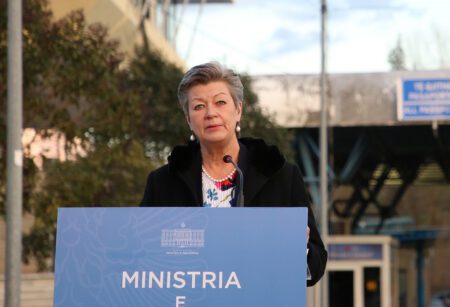Thanks to progressive leadership, EU is making progress on the Pact on Migration and Asylum
June 10, 2023
Future of Europe & Neighbourhood3 minute read

European Commissioner for Home Affairs Ylva Johansson at the Kakavia Border Crossing Point in Albania. 20 February 2021. Photograph: EC - Audiovisual Service
After years of deadlock on a common EU approach on asylum and migration policy, thanks to the leadership of progressive European Commissioner for Home Affairs Ylva Johansson, EU member states have reached – by a large majority – an agreement on two key files.
At the Justice and Home Affairs meeting, ministers backed two key pillars of the reform of asylum and migration: the Asylum and Migration Management Regulation (AMMR), which covers member states’ solidarity efforts towards countries of first entry and the so-called Dublin rules, and the Asylum Procedures Regulation (APR), which organises responsibility and creates an asylum procedure at the border.
The political agreement – endorsed by a margin wider than anticipated, with only Hungary and Poland opposing the final draft – allows the EU Council to start negotiations with the European Parliament on the files.
PES President Stefan Löfven said:
“Thanks to Commissioner Johansson, and the mobilisation of our PES governments, we are finally making progress on progressive plans for a common EU approach on asylum and migration policy. The EU must now swiftly find an agreement on the whole Pact before the end of this political mandate. Socialists and democrats are determined to make sure we get all files of the Pact adopted before the EU elections.
“This agreement paves the way to a common approach based on mandatory solidarity and shared responsibility. It proves that there is trust and political will to face the challenges together and turn them into opportunities. Progressives are determined to move the EU from an ad hoc, crisis-driven approach, to a safe, sustainable, fair, and predictable system.”
Last month, the Migration and Integration Network of the PES called for the adoption of the Pact during this mandate. At its meeting in February, the PES Presidency also adopted unanimously a declaration in support of the Pact.
The first file agreed in the EU Council – the APR – establishes a common procedure across the EU that member states need to follow when people seek international protection. The regulation contains a border procedure rule which allows for the quick assessment, at the EU’s external borders, of whether applications are unfounded or inadmissible.
The other file – AMMR – aims to replace the current Dublin regulation. The AMMR determines which member state is responsible for the examination of an asylum application. It also establishes a new migration management and solidarity mechanism which would assure a more even distribution of migrants across the EU.
The most innovative element of the Pact – spearheaded by Commissioner Johansson – is a system of “mandatory solidarity” which means that all member states must act in solidarity in times of migratory pressure, but with flexibility on the specific nature of their contribution. The choices are built around three options: accepting a number of relocated asylum-seekers; making a financial contribution; and providing operational support, such as infrastructure and personnel.
Germany’s Pro Asyl calls EU migration deal ‘outsourcing’ refugee protection

Germany’s Pro Asyl organisation on Friday criticized an EU migration deal and warned it could serve as a blueprint for other parts of the world.
“What was decided yesterday de facto is a coalition of the unwilling who are saying ‘we’ll call it asylum reform but in fact, we will outsource the protection of refugees to third countries outside of Europe,” said the organisation’s Karl Kopp.
Pro Asyl has been lobbying for the interests and rights of asylum seekers for decades.
Kopp said what the EU called “historic” was in fact “a terrible sign to the world: a big club of 27 democracies says ‘refugee protection, yes, but please not here.”
The agreement would introduce a new expedited border procedure for those deemed unlikely to win asylum to prevent them from lingering inside the bloc for years.
Poland and Hungary – among the EU’s loudest voices against accepting sea immigrants – opposed the deal, saying the bloc’s national leaders should return to the matter when they meet later in June. That, however, did not scupper the majority deal.
The Association of Germany’s Districts, Landkreistag, welcomed the “long overdue” decision and said the districts’ “capacities to accommodate and especially to integrate the refugees are exhausted.”
“We have taken in one million refugees from Ukraine and we still have a lot of the refugees who came here in 2015 and 2016 and just in the first four months of this year, we have taken in 100,000 refugees from Afghanistan, Syria, Turkey and northern Africa,” Kay Ruge of the Landkreistag told Reuters Television.
Source: Reuters

No comments:
Post a Comment